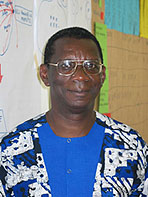22 October 2003
MediaNews 11 - October 2003
‘Journalism is about more than just creating awareness’
Partner profile: 10 years NSJ
By Barbara Bosma
Whether they report on a corruption scandal or a soccer match, journalists in southern Africa have got a vital part to play. Their work, in the view of the Southern Africa Media Trust (NSJ), should support democratisation. Since its inception, ten years ago, NSJ has trained no less than two thousand journalists.  | | Ransford Antwi |
The spot where Carlos Cardoso, Mozambique’s best known journalist, died three years ago is only three blocks away from the NSJ Maputo head office. Cardoso was shot and killed because he knew too much about corruptive practices of high-placed persons.
Today a memorial stands on the spot, serving as a lasting reminder for all to work for the democratic development of southern Africa. NSJ wants to pull its weight boosting the professionalism and expertise of media practitioners.
Africanisation
NSJ, set up ten years ago after the demise of apartheid, joined SADC and Scandinavian countries in an organisation with a predominantly Western board. Soon, however, NSJ wanted to ‘Africanize’. Journalists from a number of countries in the region took charge of the co-ordination; most have continued working for NSJ to this day.
In 2001 NSJ was officially transformed into a trust, owned by regional media organisations including the Media Institute for Southern Africa (MISA) and the Southern African Broadcasters Association (SABA).
While the original emphasis was on basic education, the organisation soon moved over to training journalists in the middle of their careers. ‘Journalists often pick up the basic principles as they go along. What they actually need is short, more specific training courses which they can attend in the course of their careers,’ said training manager Ransford Antwi.
Today NSJ has become a household word among journalists in southern Africa. Enrolments for the courses by far surpass the maximum number of participants. In 2002 NSJ held 46 courses, attended by 276 journalists. NSJ not only offers training courses; it can also be hired for workshops, media consultancy and the development of training materials. Among NSJ’s publications in 2001 was the Gender Sensitive Reporting Manual, commissioned by UNESCO.
NSJ wants to adopt a most flexible attitude as a training institute. Rather than maintaining a permanent office fitted with classrooms it has a small permanent staff and a database of trainers that seek out their target group throughout the region.
Subjects range from investigative reporting to gender – and sports: ‘Sports unite people and contribute to a shared national spirit,’ said the director of NSJ, John Mukela. ‘Besides, people are lured into watching the T.V. news or buying a newspaper for the sports section.’
Sensitive reporting
NSJ has also developed a special training on ‘Reporting about HIV’, in which trainers pay due attention to the taboos associated with the disease, to the question of how to interview people with HIV, and to privacy. Antwi: ‘Journalism is about more than just creating awareness. It is also about changing one’s attitudes and behaviour.’
With all this NSJ sets great store by the ethical implications of reporting. ‘Journalists should achieve the right balance between their having to provide factual information and the way they present their reports. We help them to develop a certain sensitivity in this respect.’
Reporting can only be done if based on a genuine knowledge of the facts. That is why NSJ wants to start a collaboration with an international medical organisation in its training activities.
Media a luxury
NSJ is also firmly advocating training certificates. It wants to reward journalists who have successfully completed a number of training modules with a diploma. Talks are under way with universities in various countries on the international recognition of the documents.
The main challenge facing NSJ is how to obtain sufficient income from various sources. The organisation wants to increasingly promote itself as an institute that can be hired for specific assignments, and at the same time look for additional funds. Only this will enable it to continue its programme of training courses which journalists can afford. In Africa it remains difficult to obtain support for media development from governments. Governments are disinclined to invest in it; some consider strong media a threat, others simply don’t recognise their importance.
‘To them communication is a luxury, something that they would cut down on first. Strong media are an indispensable precondition, however, if we want to build up a civil society and, with it, democracy. Media give people a voice and put groups in motion,’ according to the NSJ director. For southern African media the activities of NSJ are a dire necessity, and absolutely no luxury as yet. Barbara Bosma works as an independent journalist in Maputo barrazulu@teledata.mz
|

